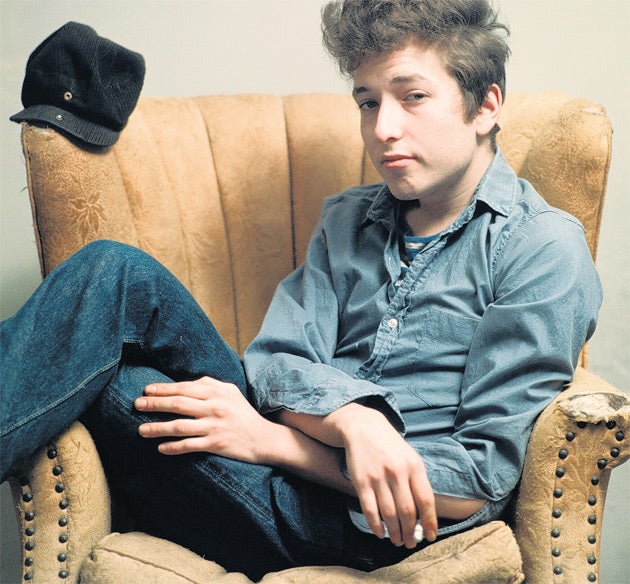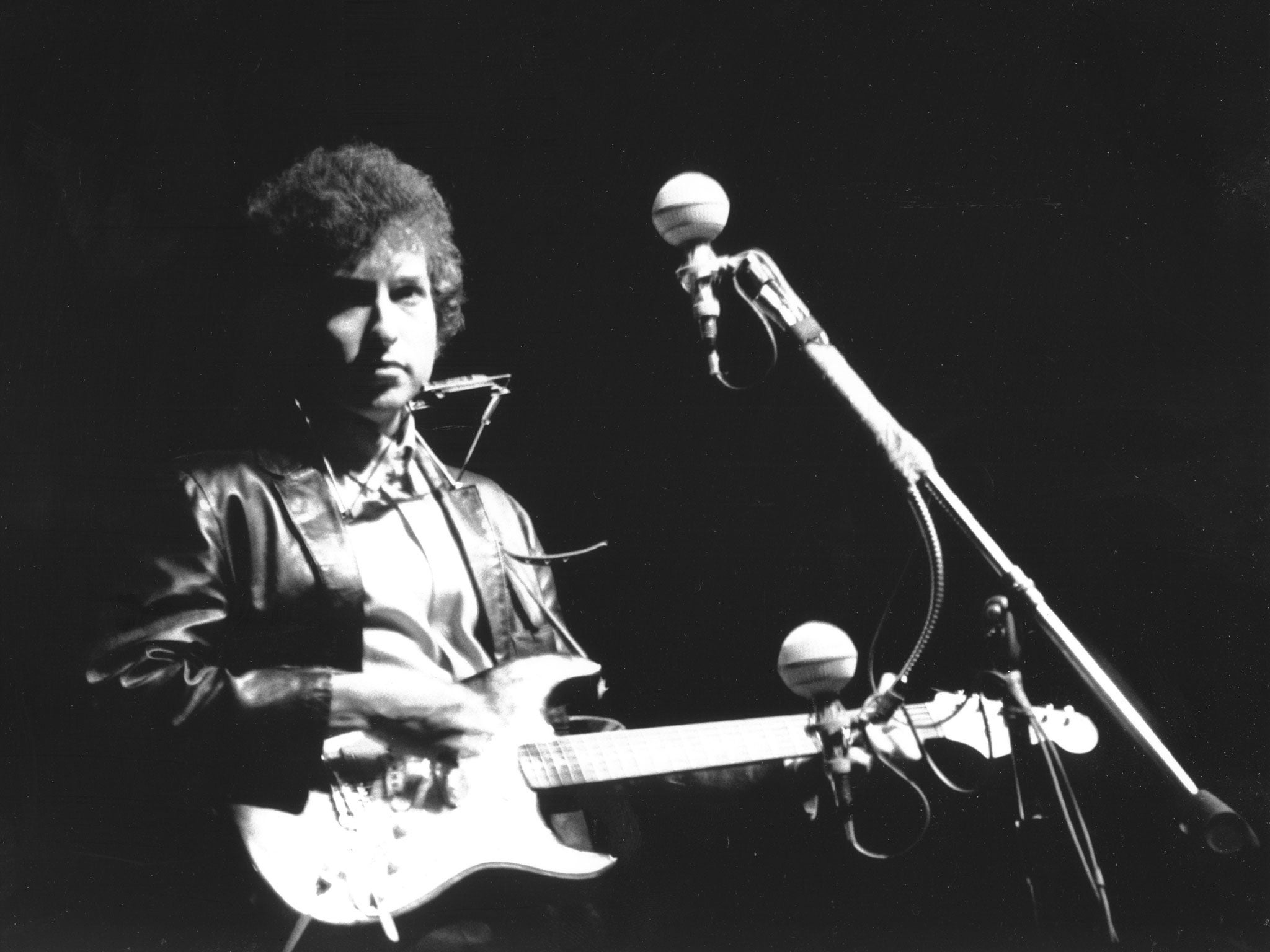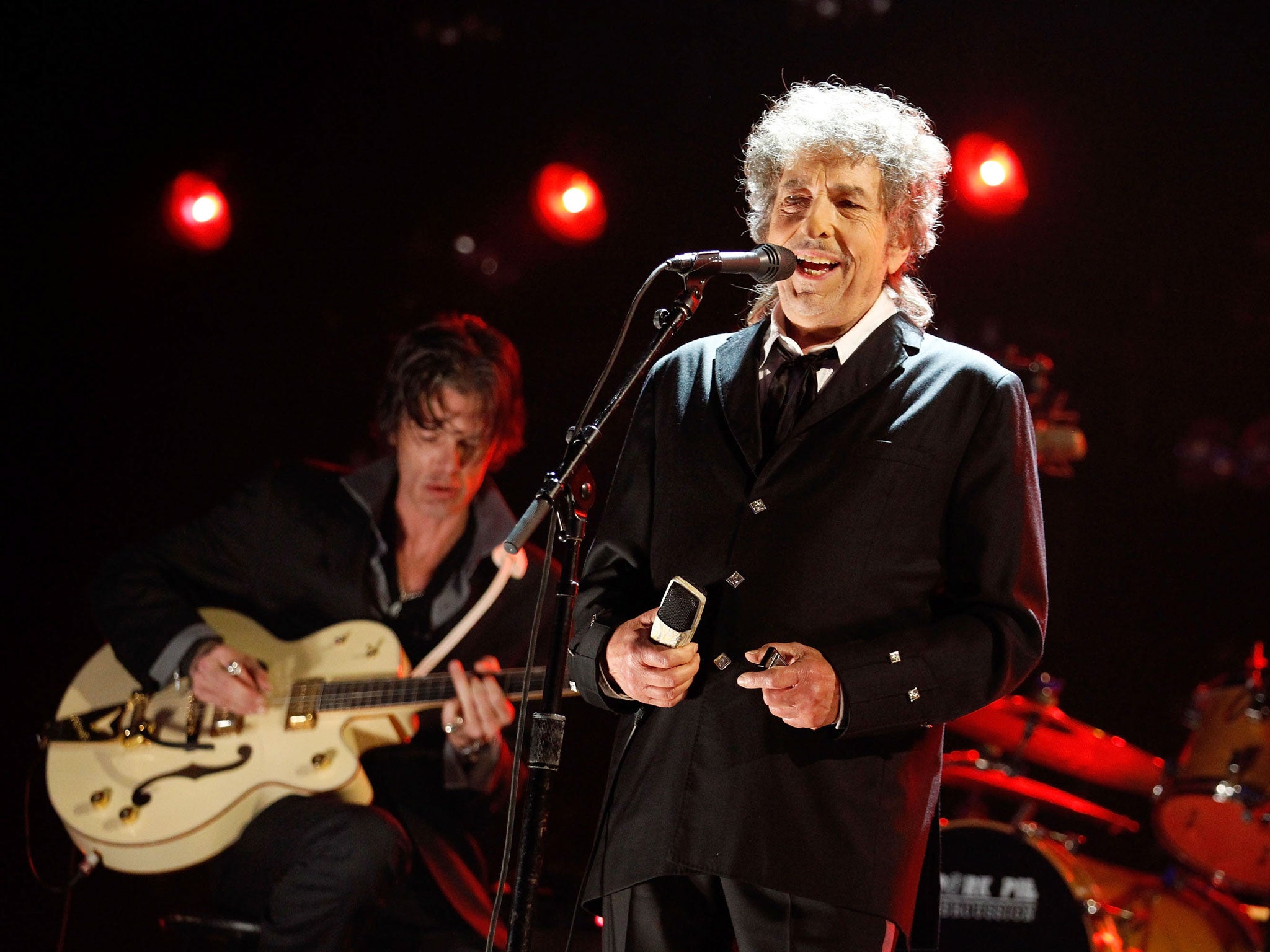70 reasons why Bob Dylan is the most important figure in pop-culture history
From 'Blowin' in the Wind' to Blonde on Blonde

Bob Dylan has won the Nobel Prize for Literature for having “created new poetic expressions within the great American song tradition”.
The singer, poet, and novelist turned 75 earlier this year, while in 2011 - on his 70th birthday - The Independent listed 70 reasons Dylan is the most important figure in pop-culture history.
To celebrate Dylan's prestigious Nobel Prize win, here are those 70 reasons once again, the list ranging from writing 'Blowin' in the Wind' to helping form The Band.
Originally published 20 May 2011. Amended 13 October 2016.
1. Because he wrote the song "Blowin' in the Wind".
2. Because he made teenagers interested in poetry again. He offered a route into symbolists like Rimbaud, Verlaine and Baudelaire, and City Lights beats like Ginsberg, Corso and Ferlinghetti.
3. Because when Martin Luther King Jr gave his legendary "I have a dream" speech, Dylan wasn't just in the audience, he was on stage a few feet from Dr King, having just sung "Only a Pawn in Their Game" and "Blowin' in the Wind".
4. Because he invented folk-rock.
5. Because he's a member of the Songwriters Hall of Fame, Rock and Roll Hall of Fame, and Nashville Songwriters Hall of Fame.
6. Because he uses the best pseudonyms since WC Fields. Dylan has called himself things like Robert Milkwood Thomas (get it?), Tedham Porterhouse and Blind Boy Grunt. The teenage Robert Zimmerman sought work as a rock'n'roll pianist called Elston Gunnn. These days, he produces his own records as Jack Frost.
7. Because in his 1959 High School Yearbook, his stated ambition was "to follow Little Richard".
8. Because he rescued folk music from the grasp of bearded guys in cable-knit sweaters fantasising about being sailors or soldiers. Admittedly, there was already a topical songwriting element to folk music before Dylan came along, exemplified by Woody Guthrie and Pete Seeger, but until he democratised the form, folk was mostly the domain of slumming middle-class sophisticates in search of some more "authentic" escape from late-1950s suburban American conformity.
9. Because of his unique mixture of gravity and comedy. Even on albums that included songs as serious as "Masters of War" and "A Hard Rain's a-Gonna Fall", there would always be room for a surreal, jokey talking blues or two.
Enjoy unlimited access to 100 million ad-free songs and podcasts with Amazon Music
Sign up now for a 30-day free trial. Terms apply.
ADVERTISEMENT. If you sign up to this service we will earn commission. This revenue helps to fund journalism across The Independent.
Enjoy unlimited access to 100 million ad-free songs and podcasts with Amazon Music
Sign up now for a 30-day free trial. Terms apply.
ADVERTISEMENT. If you sign up to this service we will earn commission. This revenue helps to fund journalism across The Independent.
10. Because he wrote "It Ain't Me, Babe", the world's first anti-love song.
11. Because he took a hot backing band called The Hawks and transformed them into The Band, arguably the greatest rock band of all time, and indisputably the seed-corn for all subsequent "Americana"/roots revivalist movements in pop and rock. After guitarist Robbie Robertson had lived in Bob's pocket for the duration of the 1966 world tour, they had a songwriter skilled enough to bring such focus and depth to those skills that they were able to create Music From Big Pink and The Band, two of the emblematic albums of the era.
12. Because, while others at Live Aid were preening their egos about how much they were helping Those Poor Starving Africans, he had the temerity to bring things a little closer to home by suggesting that perhaps some of the money might be used to pay the crippling mortgages that were putting American farmers out of business. Willie Nelson was inspired to instigate Farm Aid.

13. Because he wrote "Mr Tambourine Man".
14. Because he made nasty lyrics acceptable. Until Dylan released "Like a Rolling Stone" and "Positively 4th Street", pop singles had generally toed the lovey-dovey romantic party-line. Suddenly, pop songwriting was afforded new vistas of theme and nuance, most notably reflected in John Lennon's letting of his inner cynic off the leash.
15. Because he invented country-rock. Before Nashville Skyline, country was considered square and conservative in rock circles.
16. Because he went from being Hammond's Folly to The Voice of a Generation in the space of one album. When his first record sold poorly, many at Columbia sneered at producer John Hammond's faith in the young Dylan. Just over a year later, his second album featured "Blowin' in the Wind", "A Hard Rain's a-Gonna Fall", "Masters of War" and "Don't Think Twice, It's Alright".
17. Because it took six different actors to play him in Todd Haynes's Dylan biopic I'm Not There. One of them was a black child. Another was Cate Blanchett.
18. Because he pledged the entire proceeds of his Christmas album Christmas in the Heart to homeless charities, in perpetuity. Sure to sell each year, it's the gift that keeps on giving.
19. Because he had the balls to take an electric blues band on stage with him at the 1965 Newport Folk Festival and crank up the volume. This became one of the landmark events in rock history. Dylan's marriage of rock music and folk literacy effectively laid the blueprint for the soundtrack to the whole counter-cultural experiment.
20. Because he refuses to let a lack of aptitude or technical competence prevent him from painting pictures, writing "novels" (Tarantula), or making films (Eat the Document, Renaldo and Clara).
21. Because, rather than parade his nuptials in public via the pages of trashy celebrity magazines, he goes to extreme lengths to keep his marriages private.
22. Because he dared to release six-minute singles. Before "Like a Rolling Stone", singles were routinely kept shorter than three minutes, in order to maximise revenue from jukeboxes.
23 Because The Freewheelin' Bob Dylan was such a huge influence on The Beatles. "We just played it, just wore it out," said George Harrison. "The content of the song lyrics and just the attitude – it was incredibly original and wonderful." John Lennon said: "For three weeks... we didn't stop playing it. We went potty about Dylan."
24. Because he introduced The Beatles to pot, without which there may have been no Rubber Soul, Revolver or Sgt Pepper.
25. Because he has won Oscars, Golden Globes, and Grammys.
26. Because he wrote "Visions of Johanna", the greatest song of all time. Former Poet Laureate Andrew Motion proclaimed it the greatest song lyric ever.
27. Because in May 1963, a fortnight prior to the release of Freewheelin', when The Ed Sullivan Show refused to let him perform the satirical "Talkin' John Birch Society Blues", he chose to walk out rather than submit to censorship. He was still a relative nobody, and the show was TV's greatest promotional tool.
28. Because he's the hardest working man in showbiz, with a Never Ending Tour that just goes on and on. Dylan plays between one and two hundred gigs worldwide every single year, with minimal fuss.
29. Because when he was trying to explain the kind of music he wanted to create during his electric period, he came up with the phrase "that thin wild mercury sound", a better five-word nugget than most songwriters' entire output.
30. Because he brought a rare wit and intelligence to the wearisome task of dealing with the media, from the impromptu surreal advice at a London press conference to "keep a good head and always carry a lightbulb", to somewhat sharper responses to enquiries about his integrity. "Deep down, you must have convictions," suggested one Australian interrogator, receiving the answer, "Nah, deep down there's nothin' but guts, intestines."

31. Because he made Blonde on Blonde, the greatest album ever recorded.
32. Because he wrote "A Hard Rain's a-Gonna Fall" when barely out of his teens, a string of apocalyptic images which altered the way topical singers thought about writing protest songs. He described it as a song in which each line was the start of an individual song he was fearful of not living long enough to write (this being the era of the Cuban Missile Crisis, when Armageddon seemed just around the Bay of Pigs).
33. Because that classic mid-Sixties Dylan look – bird's-nest hair, dark shades, pipe-cleaner legs, Chelsea boots, razor-sharp cheekbones – is the coolest look ever. Just ask John Cooper-Clarke.
34. Because he redefined what was acceptable, and possible, in pop singing. Though widely derided at the time as a tuneless whine, his style was a highly articulate, emotive blues delivery.
35. Because of the "Judas!" incident – not for having it shouted at him, but for the sharpness of his response, "I don't believe you" (a reference to his song thus named), and his surly instruction to The Hawks to "play fuckin' loud!".
36. Because he was asked to write incidental music for a Western in which he was playing a bit part, and came up with "Knockin' On Heaven's Door", a song so moving it has become a musical meme.
37. Because, without Bob Dylan, there'd have been no Byrds.
38. Because he invented the pop video with the card-dropping sequence filmed outside the Savoy Hotel for "Subterranean Homesick Blues", now a pop-culture cliché so often parodied that parodying it has itself become a parody.
39. Because he effortlessly confounds expectations, not least about his own material. During the 1980s, his most fallow period creatively, he left two of his best songs in years – the scourging "Foot of Pride" and the majestic "Blind Willie McTell" – off the album for which they had been recorded. The latter is now a live favourite.
40. Because he made the harmonica fashionable, and showed pop culture how expressive an instrument it could be.
41. Because he took Allen Ginsberg with him when he went on tour, a selfless act of cultural outreach that it's impossible to imagine happening today.
42. Because he has been quoted in American legal proceedings more times than any other songwriter – a whopping 186 times, according to a 2007 study, compared to The Beatles' paltry 74. But who could resist such aphoristic gems as, "When you got nothin', you got nothin' to lose" and, "To live outside the law, you must be honest"?
43. Because he crystallised the notion of social protest as a cultural pursuit for a generation.

44. Because when he wrote Chronicles, the first part of his autobiography, it actually helped explain things about his art and the way he worked.
45. Because he's the most unquenchable music fan himself. Dylan's Theme Time Radio Hour series may be the single most educational (and amusing) history lesson in 20th-century Western popular music ever curated.
46. Because he wrote "Like a Rolling Stone", frequently voted the greatest single of all time, and a song whose seismic impact in the pop scene of 1965 was like the drawing back of a curtain.
47. Because of the way he constantly revises his classic old material in concert. Infuriating for some, this process of revision is a vital way of keeping the songs interesting for him, and for his audience. There's no danger that a Dylan show will just be a facsimile run-through of heritage tracks.
48. Because he wrote "All Along the Watchtower", and provided Jimi Hendrix with his most potent vehicle. The same could be said, with other songs, for The Byrds (several times); Manfred Mann; Peter Paul and Mary; Julie Driscoll, Brian Auger & The Trinity; and more.
49. Because his 1966 world tour with The Hawks effectively invented rock music, as distinct from rock'n'roll: nothing that loud, and that powerful, had been heard on stage before.
50. Because, back in the 1970s, just as most fans and critics were considering him washed-up and mined-out, he somehow came up with Blood on the Tracks, an indisputable classic containing some of his finest songs. He has repeated this trick many times.
51. Because he brought an unparalleled – then and now – philosophical and artistic depth to the humble pop lyric, incorporating a wealth of literary, religious and historical references within surreal "chains of flashing images", as Allen Ginsberg described them. And unlike his imitators, he managed to make them mean something.
52. Because, with his last album, Together Through Life, he became the oldest performer to debut at No 1 on the US album chart, and the oldest performer to top both UK and US charts simultaneously.
53. Because when he wrote a protest song, it made a difference. Thanks to "The Lonesome Death of Hattie Carroll", his powerful 1964 account of the death of a poor black serving-woman at the whim of a Baltimore society blade who served a derisory sentence, the killer in question, one William Zantzinger, lived the rest of his life in bitter ignominy.
54. Because of his nimbleness in sidestepping cultural trends. Just as Western youth was becoming obsessed with protest songs, he slipped into more personal, surreal territory; and a few years later, just as Western youth was becoming obsessed with the DayGlo paisley counter-culture which those surreal songs had helped create, he opted out of psychedelia to woodshed more rootsy material with his friends in The Band. The resulting Basement Tapes became a trove of strange new material for others to cover, instigating both the bootlegging phenomenon and the widespread interest in what became known as "Americana".
55. Because, when included in Time's 100 Most Important People of the Century, he was called "master poet, caustic social critic and intrepid, guiding spirit of the counter-culture generation".
56. Because just as the world was going disco in the mid-1970s, he chose to revive the notion of a travelling gypsy revue of poets, playwrights and troubadours, the Rolling Thunder Revue, and film it as the world's most expensive home-movie, Renaldo and Clara.
57. Because he is the only contemporary songwriter to have one of his songs prompt a homily by the Pope. Playing for Pope John Paul II at the World Eucharistic Congress in Bologna in 1997, he was greeted by the Pontiff with the reflection: "You say the answer is blowing in the wind, my friend. So it is: but it is not the wind that blows things away. It is the wind that is the breath and life of the Holy Spirit, the voice that calls and says, 'Come!'."

58. Because he wrote "Subterranean Homesick Blues", a condensed well-spring of social comment via catchphrase and slogan that remains one of the most compelling raps ever put to tape.
59. Because he has on several occasions deliberately appeared to defy fans' expectations in a career-threatening manner, most notably with the 1970 double-album Self Portrait, a collection so contrary and shambolic critic Greil Marcus's opening line in his Rolling Stone review became a legendary catchphrase: "What is this shit?". Then there was the bible-thumping admonishment of his Christian period, when audiences were subjected to fire-and-brimstone sermons rather than favourite songs.
60. Because, if you turn the cover of John Wesley Harding upside-down and look at the bark of the tree, you'll see The Beatles (vinyl only) (drugs optional).
61. Because he created an entire industry of Dylanologist commentators and interpreters, way beyond the attention afforded any other songwriter or performer.
62. Because, honouring Dylan at the Kennedy Center Honors Reception, President Clinton described him as "striking the chords of American history and infusing American popular music... with new depth and emotion. He probably had more impact on... my generation than any other... artist."
63. Because he made Bringing it All Back Home, the album on which folk music first transmuted into rock music.
64. Because, when Bruce Springsteen inducted him into the Rock and Roll Hall of Fame, he said: "Bob freed your mind the way Elvis freed your body – he showed us that just because music was innately physical did not mean that it was anti-intellectual."
65. Because, while other artists of his generation have struggled to come close to the creative power of their youth, Dylan has found renewed strength and inspiration: the recent "trilogy" of Time Out Of Mind, Love and Theft and Modern Times is his most sustained burst of artistic potency since the mid-1960s "electric" trilogy.
66. Because he made "Highway 61 Revisited". Which rocks.
67. Because Tom Waits called him "a planet to be explored... for a songwriter, Dylan is as essential as a hammer and nails and a saw are to a carpenter".
68. Because just when everyone thought he was washed-up (again) after a terrible time in the 1980s, he came up with Oh Mercy, one of his most atmospheric and memorable albums.
69. Because he remains the most frequently covered songwriter of modern times. 1997's "Make You Feel My Love" is a recent song to have assumed classic status, with hit versions by Billy Joel, Garth Brooks and Adele.
70. Because he took the 2008 Pulitzer Prize Special Citation for "profound impact on popular music and American culture, marked by lyrical compositions of extraordinary poetic power".
Join our commenting forum
Join thought-provoking conversations, follow other Independent readers and see their replies
Comments